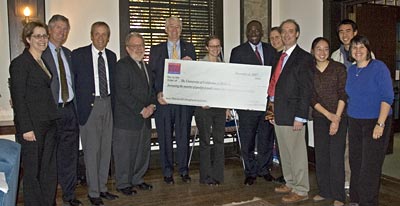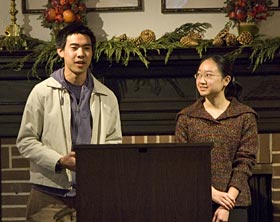UC Berkeley Web Feature
 |
UC Berkeley leaders and Cal Teach officials and students celebrate the National Science & Math Initiative's $2.4 million grant to the program. (Deborah Stalford photos) |
Cal Teach celebrates $2.4 million grant to foster science and math teaching
BERKELEY – Officials and students gathered at UC Berkeley on Tuesday (Dec. 11) to celebrate a $2.4 million grant from the National Science & Math Initiative (NMSI) to the Cal Teach program, which promotes science and math teaching among Berkeley's science, math and engineering undergraduates.
The award was announced as part of an NMSI effort funded by Exxon Mobil to help reverse a national shortage of credentialed science and math teachers. Twelve institutions across the country are receiving NMSI grants totaling $25 million for programs modeled after the successful UTeach program launched in 1997 at the University of Texas at Austin. NMSI is a nonprofit organization created to promote improvement of the nation's math and science education in the United States, and UC Berkeley has received the largest of its latest awards.
 Cal Teach students Brian Ikkanda and Dorothy Tang talk about their experiences in the program at Tuesday's Women's Faculty Club ceremony. |
Mark Richards, executive dean of the College of Letters & Science, dean of its division of mathematical and physical sciences, a professor of earth and planetary science and a University of Texas at Austin alumnus, said that programs such as Cal Teach and UTeach "will inspire a national agenda."
UC President Robert Dynes said the ceremony, held at the Women's Faculty Club, marked "a happy day for the Berkeley campus and a happy day for the University of California."
The Cal Teach Web site notes that just 4 percent of California's 9th graders now go on to earn a bachelor's degree in science, math or engineering, and that nearly 1,500 math and 800 science classes in California high schools were taught in 2002-2003 by teachers with no teaching credential. Even more science, math and engineering courses were taught by someone with a credential unrelated to those subjects.
Dynes said that he has encountered entire districts - from Redding to the Imperial Valley to East Los Angeles - that lack any credentialed science or math teachers and that he found the students in these districts "were already way behind and had little chance" of becoming literate in science and math. The problem can be rectified within a decade with programs such as Cal Teach, which are showing students that teaching is a valued and important profession for them to enter, he said.
The entire UC system is partnering with the California State University system, state government and industry leaders to boost the number of qualified science and math teachers in California classrooms. UC Berkeley's Cal Teach partners come from science, math and engineering programs as well as from the campus's Graduate School of Education and the Lawrence Hall of Science, from Lawrence Berkeley National Laboratory, as well as from the Berkeley, Oakland and Emeryville school districts.
"If we're ever going to have an inclusive society, one of the things we're going to have to solve is the math-science dilemma," said UC Berkeley Chancellor Robert Birgeneau, a physicist and a champion of equal educational opportunity from kindergarten through college.
He cited a 2007 report, "Rising Above the Gathering Storm: Energizing and Employing America for a Brighter Economic Future," in which leading educators were asked by congressional policy makers to examine the strengths and weaknesses of U.S. competitiveness in terms of science and technology in the global marketplace.
Gerald McElvy, president of the Exxon Mobil Foundation, said Exxon Mobil is interested in improving the focus and effectiveness of the philanthropic support for science and math education to heal what he called "an educational divide, especially in urban schools."
Still more financial support is needed, said McElvey, noting that the latest NMSI grants represent less than a month of U.S. spending in Iraq. He added that his comment reflects concern about national priorities and is not an anti-war statement.
Programs such as Cal Teach and UTeach will be proven successful, he said, when there is no difference in academic performance from school to school, despite variations in students' family incomes. "We're so far from that now we can scarcely imagine what that would look like,"
said Michael Marder, co-director of UTeach.
David Pearson, dean of UC Berkeley's Graduate School of Education and chair of the California Commission on Teacher Credentialing, said Cal Teach is "a truly watershed project for UC Berkeley" and called equality of education in science and math "a civil right we haven't delivered on."
Cal Teach enrolled 18 UC Berkeley students in courses during its first semester. A year later, the program drew about 90 students and during its two years of operation, some 200 students have signed on. Program organizers said they expect to draw still more students in the spring 2008 semester and Richards said he is encouraged by the strong response.
Brian Ikkanda, a UC Berkeley chemical biology major, education minor and Cal Teach participant, said he enjoys helping younger students learn "and get as enthusiastic about science as I am."
More information about Cal Teach is available online.

